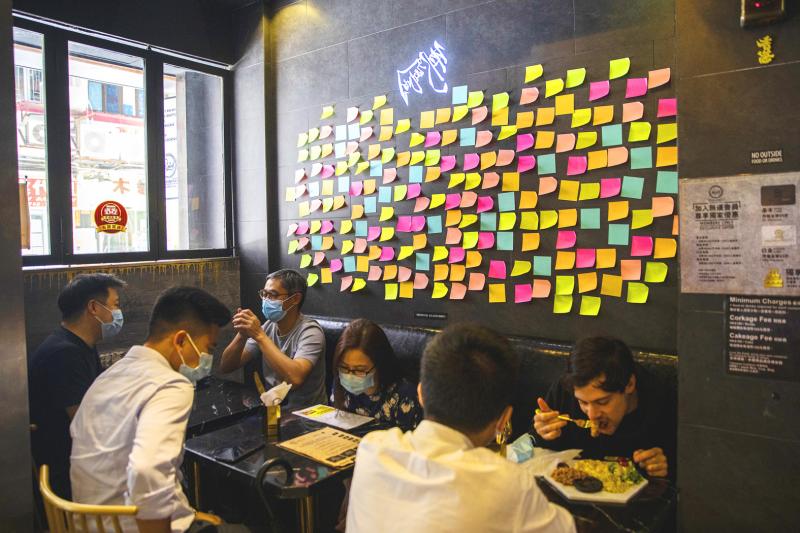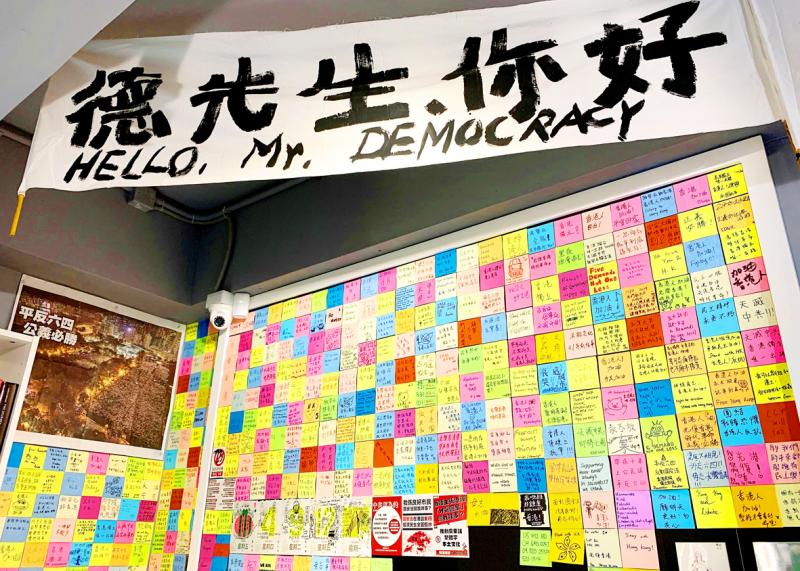At midnight on Tuesday, the Great Firewall of China, the vast apparatus that limits the country’s Internet, appeared to descend on Hong Kong.
Unveiling expanded police powers as part of contentious new national security legislation, the Hong Kong government enabled police to censor online speech, and force Internet service providers to hand over user information and shut down platforms.
Many residents, already anxious since the legislation took effect last week, rushed to erase their digital footprint of any signs of dissent or support for the past year of protests.

Photo: Bloomberg
Hong Kong Legislator Charles Mok (莫乃光), a pro-democracy member of the Legislative Council who represents the technology sector, wrote on Twitter: “We are already behind the de facto firewall.”
Hong Kong is facing a dramatic decline of one of its most important advantages — a free and open Internet — a defining trait that sets it apart from China where Facebook, Twitter, Google and most major foreign news sites are blocked.
The prospect of Beijing-style Internet controls — where residents are not just restricted, but monitored and punished for what they post online, while companies are forced to censor their platforms — is worrying for citizens, activists and businesses in Hong Kong.

Photo: Reuters
The law gives authorities the power to demand individuals and service providers remove content, or access to content deemed threatening to national security. Noncompliance can result in fines and imprisonment for company staff or individuals.
Police investigating national security cases can survey communications and confiscate electronic devices.
“The law seems to be building up the Great Firewall locally in Hong Kong. Personal freedom on the Internet will be eliminated,” said Charles Low (羅浩林), chairman of the Hong Kong chapter of the Internet Society. “If you say something wrong they can request the service provider to give your IP address or mobile number so they can grab you.”
After the new measures were announced late on Monday, Facebook, Microsoft, WhatsApp, Google, Twitter, Telegram and others said they would not process information requests from the government until they had reviewed the law.
TikTok, owned by Shenzhen-based ByteDance, said it was leaving Hong Kong altogether.
“We used to be an Internet and telecom hub in the region. Companies moved services from the mainland to Hong Kong and now Hong Kong has become like China, so they will leave,” Mok said.
Protesters who have relied on digital tools over the past year to mobilize demonstrations now find those same platforms could be used against them.
Political groups have already disbanded and formerly outspoken activists have quietly left social media, while others have deleted old comments.
“We had freedom before and now it is being taken away. It is extremely painful for me to experience that,” said Glacier Kwong (鄺頌晴), a digital rights advocate. “There will be a loss of information available to the public because people are afraid to speak up. They are controlling the discourse, how people can think about things and what they can think about. It’s very dangerous.”
Experts said it is precisely because Hong Kongers used digital tools so effectively against the territory’s government that authorities are now targeting the online space.
The movement that erupted last year managed to mobilize without leaders through platforms such as the LIHKG forum and messaging app Telegram — with a level of organization that Beijing has tried to point to as evidence to claim the demonstrations are coordinated by foreign forces.
“It comes back to how effectively Hong Kong used the Internet. To crack down on the protests you’ve got to take away that tool,” said Elise Thomas, a researcher at the Canberra-based Australian Strategic Policy Institute focusing on Internet freedom.
Experts said that China’s Great Firewall — which allows the government to inspect data as well as block IP addresses and domain names — could not be immediately replicated in Hong Kong, home to several private Internet service providers and Internet exchanges.
“It will take at least a few years to build up the wall,” said Low, adding that what is more likely is a partial blackout, cutting off access to certain sites such as LIHKG or Telegram.
Others worry the measures could go even further than in mainland China. The law covers not only Hong Kong permanent residents and foreigners within Hong Kong, but anyone seen as contravening the law, regardless of where they are in the world.
One goal of the restrictions in Hong Kong could simply be making access to certain platforms and technology difficult enough that regular residents would not bother — a strategy that analysts say authorities also use on the mainland.
However, Hong Kongers, accustomed to decades of unrestricted access to information, might not be so easily deterred.
Since Beijing announced its plan in late May to enforce the security legislation, searches and purchases of virtual private networks (VPNs), and proxies to hide IP addresses have soared.
Many have migrated from Telegram to the encrypted messaging app Signal, and some residents have turned to SIM cards from providers in other countries.
Kwong says it is not just young protesters who are taking action — her parents recently moved their family group chat to Signal.
“People are indeed kind of panicked and trying to install VPNs and have no idea what it can and cannot help,” said Low, adding that volunteers have been holding workshops to teach residents how to use such tools and how to better protect themselves.
“I have faith in Hong Kong people. They will not forget about the freedom we once had,” he said.

IDENTITY: A sex extortion scandal involving Thai monks has deeply shaken public trust in the clergy, with 11 monks implicated in financial misconduct Reverence for the saffron-robed Buddhist monkhood is deeply woven into Thai society, but a sex extortion scandal has besmirched the clergy and left the devout questioning their faith. Thai police this week arrested a woman accused of bedding at least 11 monks in breach of their vows of celibacy, before blackmailing them with thousands of secretly taken photos of their trysts. The monks are said to have paid nearly US$12 million, funneled out of their monasteries, funded by donations from laypeople hoping to increase their merit and prospects for reincarnation. The scandal provoked outrage over hypocrisy in the monkhood, concern that their status

Trinidad and Tobago declared a new state of emergency on Friday after authorities accused a criminal network operating in prisons across the country of plotting to kill key government officials and attack public institutions. It is the second state of emergency to be declared in the twin-island republic in a matter of months. In December last year, authorities took similar action, citing concerns about gang violence. That state of emergency lasted until mid-April. Police said that smuggled cellphones enabled those involved in the plot to exchange encrypted messages. Months of intelligence gathering led investigators to believe the targets included senior police officers,

A disillusioned Japanese electorate feeling the economic pinch goes to the polls today, as a right-wing party promoting a “Japanese first” agenda gains popularity, with fears over foreigners becoming a major election issue. Birthed on YouTube during the COVID-19 pandemic, spreading conspiracy theories about vaccinations and a cabal of global elites, the Sanseito Party has widened its appeal ahead of today’s upper house vote — railing against immigration and dragging rhetoric that was once confined to Japan’s political fringes into the mainstream. Polls show the party might only secure 10 to 15 of the 125 seats up for grabs, but it is

Philippine President Ferdinand Marcos Jr is to meet US President Donald Trump this week, hoping Manila’s status as a key Asian ally would secure a more favorable trade deal before the deadline on Friday next week. Marcos would be the first Southeast Asian leader to meet Trump in his second term. Trump has already struck trade deals with two of Manila’s regional partners, Vietnam and Indonesia, driving tough bargains in trade talks even with close allies that Washington needs to keep onside in its strategic rivalry with China. “I expect our discussions to focus on security and defense, of course, but also